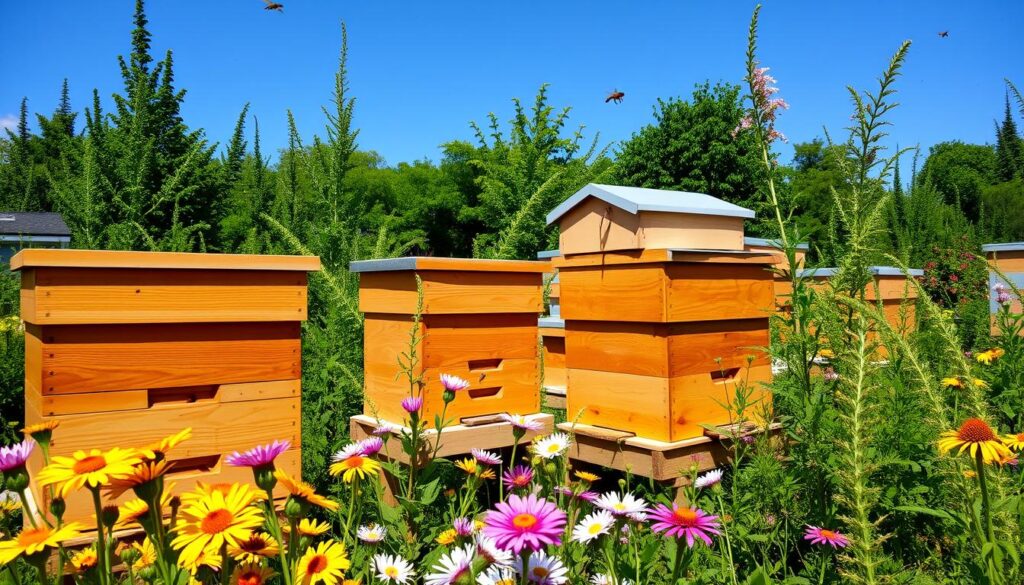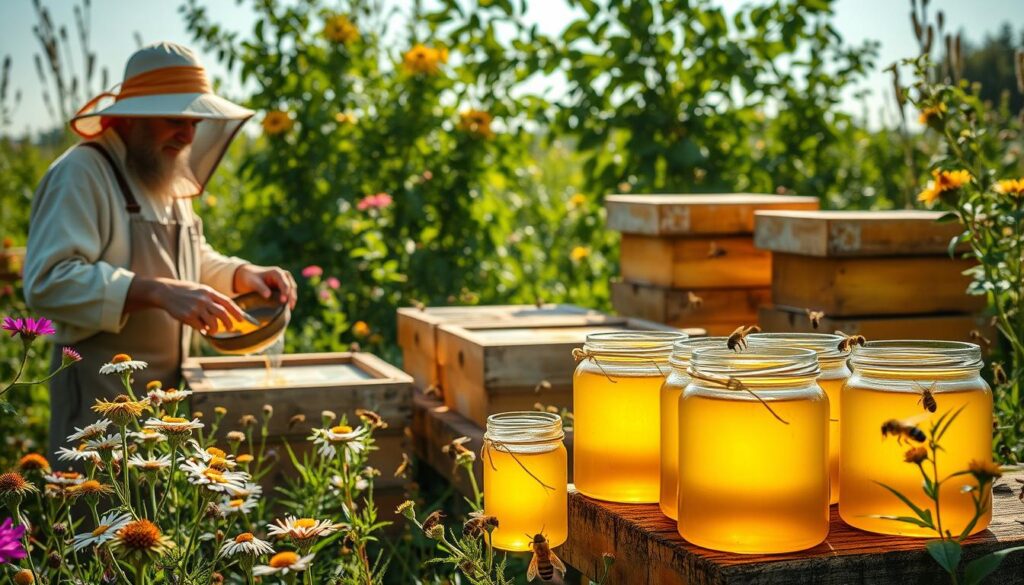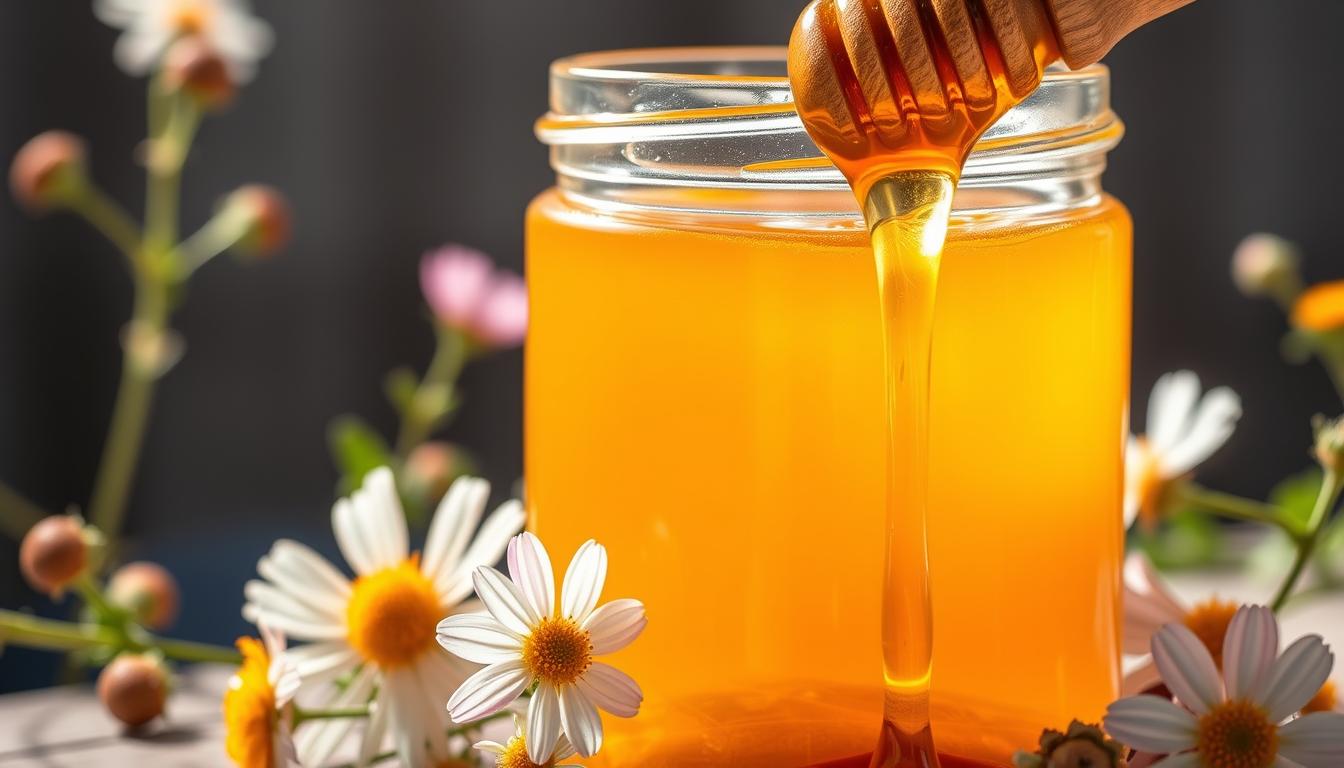Imagine a world where nature’s most delicate nectar is transformed into a golden elixir, brimming with purity and health benefits. Welcome to the captivating realm of organic honey, a true marvel of nature that has captivated the hearts and palates of people for centuries. But what exactly sets organic honey apart from its conventional counterparts, and why should we embrace this natural sweetener as part of a sustainable, health-conscious lifestyle?
Key Takeaways
- Organic honey is a pure, unprocessed natural sweetener that retains its full nutritional value.
- The organic certification process ensures that beekeepers adhere to strict standards, prioritizing the health and welfare of bees.
- Organic honey is rich in antioxidants, enzymes, and other beneficial compounds, making it a nutrient-dense superfood.
- Sustainable beekeeping practices, such as preserving bee habitats, are crucial for the production of organic honey.
- Organic honey can be a versatile ingredient in cooking and baking, offering a healthier alternative to refined sugars.
What if you could enjoy the pure, uncompromised sweetness of nature’s nectar while supporting sustainable beekeeping practices and reaping the countless health benefits? Discover the hidden secrets of organic honey and unlock a world of natural wellness and culinary possibilities.
What is Organic Honey?
Organic honey is a pure, natural sweetener that is produced by bees foraging on certified organic flowers and plants. Unlike conventional honey, organic honey is free from synthetic pesticides, herbicides, and other harmful chemicals. This ensures that the honey remains uncontaminated and retains its natural purity and nutritional value.
Understanding the Basics
Organic honey is a testament to the hard work and dedication of beekeepers who prioritize ethical and sustainable practices. These apiculture experts carefully manage their beehives, ensuring that the bees have access to diverse, pesticide-free floral sources. This not only produces raw honey of exceptional quality but also supports the overall health and well-being of the bee colonies.
Organic Certification Process
- Organic honey must meet strict standards set by regulatory bodies, such as the United States Department of Agriculture (USDA) or the European Union’s organic certification program.
- Beekeepers must demonstrate that their apiaries are located in areas free from synthetic chemicals, industrial pollutants, and other contaminants.
- Detailed records must be maintained to ensure that the honey is traceable and can be verified as truly organic.
- Ongoing inspections and audits are conducted to ensure that organic practices are being maintained throughout the honey production process.
By undergoing this rigorous certification process, consumers can be confident that the organic honey they purchase is a pure, natural sweetener that has been produced in an environmentally responsible manner, supporting the health of both the bees and the ecosystem.
Benefits of Organic Honey
Organic honey is more than just a delightful natural sweetener – it’s a veritable superfood brimming with an array of essential nutrients and health benefits. This liquid gold harvested from the hives of organic bee products offers a remarkably diverse nutritional profile, making it a powerhouse of wellness.
Nutrient-Rich Superfood
Organic raw honey is a treasure trove of vitamins, minerals, and antioxidants. It’s rich in vitamins B6, C, and D, as well as minerals like calcium, copper, iron, magnesium, manganese, phosphorus, potassium, and zinc. These vital nutrients work synergistically to support a healthy immune system, promote tissue repair, and maintain overall well-being.
- High in antioxidants that help neutralize harmful free radicals
- Contains antimicrobial properties that can aid in wound healing
- May help alleviate symptoms of seasonal allergies
- Offers anti-inflammatory benefits to soothe sore throats and coughs
- Supports digestive health and can help with gastrointestinal issues
Incorporating organic honey into your daily routine can be a simple and delicious way to enjoy the bounty of nature’s natural sweetener while reaping its remarkable health advantages.
“Organic honey is a true gift from nature, offering a rare combination of exceptional flavor and outstanding nutritional value.”
Types of Organic Honey
Organic honey is a diverse and versatile natural sweetener, with a wide range of floral sources that contribute to its unique flavors and characteristics. From the delicate and floral notes of lavender honey to the robust and earthy tones of buckwheat honey, the world of organic honey offers a captivating array of options for discerning palates.
One of the most sought-after types of organic honey is raw honey, which is unprocessed and retains its natural enzymes, vitamins, and minerals. Local honey, sourced from nearby apiaries, is also highly prized for its exceptional freshness and the ability to reflect the distinct floral profiles of the surrounding region.
Organic honeycomb is another coveted form of this natural delight, offering a true taste of the hive straight from the source. The combination of pure, raw honey and the delicate wax of the honeycomb creates a sensory experience that is unparalleled.
Regardless of the specific floral source or processing method, organic honey is a true testament to the wonders of nature and the incredible work of honey bees. Each type offers a unique flavor journey, inviting you to explore the rich diversity of this liquid gold.
To truly appreciate the nuances of organic honey, it’s worth seeking out local and regional varieties that showcase the distinct floral sources of your area. Whether you prefer the delicate nuances of clover honey or the robust intensity of buckwheat honey, the world of organic honey is a culinary adventure waiting to be savored.
Sustainable Beekeeping Practices
Responsible beekeepers play a vital role in the production of organic honey. Through their commitment to sustainable beekeeping practices, these dedicated individuals ensure that their apiaries not only yield high-quality honey but also contribute to the preservation of delicate bee habitats and promote essential pollination activities.
Ethical Apiculture Methods
At the heart of sustainable beekeeping lies a deep respect for the well-being of honey bees. Ethical apiculture methods prioritize the health and safety of the colonies, employing practices that minimize stress and disturbance to the bees. This includes the use of natural, bee-friendly materials in hive construction, the implementation of integrated pest management strategies, and a focus on maintaining a harmonious balance between the bees and their environment.
Preserving Bee Habitats
Responsible beekeepers understand the critical importance of preserving and enhancing bee habitats. They work tirelessly to create and maintain diverse, pesticide-free foraging areas that provide a steady supply of nectar and pollen for their colonies. By planting native flora and avoiding the use of harmful chemicals, these stewards of the land ensure that their bees can thrive and contribute to the overall health of the ecosystem.
Sustainable apiculture practices not only safeguard the future of organic honey production but also play a vital role in conserving the delicate balance of our natural world. By choosing organic honey products, consumers can support these eco-friendly beekeepers and contribute to the preservation of our precious bee populations.

| Sustainable Beekeeping Practices | Benefits |
|---|---|
| Use of natural, bee-friendly materials in hive construction | Minimizes stress and disturbance for honey bees |
| Integrated pest management strategies | Promotes the health and safety of honey bee colonies |
| Planting of native flora and avoiding harmful chemicals | Preserves and enhances diverse bee habitats |
| Maintaining a harmonious balance between bees and their environment | Contributes to the overall health of the ecosystem |
Organic Honey: A Natural Sweetener
Organic honey is a versatile natural sweetener that can elevate a wide range of culinary creations. Beyond its delightful flavor, this pure, unprocessed nectar offers a unique set of benefits that make it a premier choice for both cooking and baking.
Versatile in Cooking and Baking
Organic honey’s distinctive taste and texture lend themselves seamlessly to an array of dishes and desserts. Whether you’re whipping up a batch of homemade granola, drizzling it over roasted vegetables, or incorporating it into marinades and dressings, organic honey’s natural sweetness and vibrant notes can transform ordinary recipes into extraordinary culinary experiences.
In baking, organic honey is a game-changer. Its unique chemistry helps to retain moisture, resulting in soft, chewy textures in cookies, cakes, and breads. Additionally, organic honey’s caramelization properties can create a delightful depth of flavor, elevating the overall taste profile of your baked goods.
The versatility of organic honey extends beyond just flavor and texture; it can also be used as a natural sweetener in a wide range of applications, from beverages to marinades and dressings. Its diverse culinary applications make it an indispensable ingredient for home cooks and professional chefs alike who seek to harness the power of organic honey in their creations.
Harvesting and Processing Organic Honey
The journey of organic honey from the hive to the consumer’s table is a testament to the care and dedication of responsible beekeepers. This delicate process is marked by sustainable practices that prioritize the well-being of the bees and the purity of the final product.
Organic honey harvesting begins with a meticulous inspection of the hive. Beekeepers carefully monitor the colony’s health and ensure that the honey is ready for extraction, avoiding any disruption to the bees’ natural rhythms. The honeycombs are then gently removed, preserving the integrity of the wax and the precious liquid gold within.
- Gentle Extraction: The honeycombs are placed in a specialized centrifuge, where the honey is extracted through a process that minimizes heat and agitation, preserving the natural enzymes and nutrients.
- Careful Filtration: The extracted honey undergoes a delicate filtration process, removing any impurities while retaining the pollen and other beneficial components that define the unique characteristics of organic honey.
- Sustainable Packaging: The filtered honey is then carefully packaged in sustainable containers, ensuring that the natural goodness is preserved during transportation and storage.
Throughout the entire process, organic beekeepers adhere to strict protocols and ethical practices, ensuring that the honey they produce is a true reflection of nature’s finest bounty.

“The true essence of organic honey lies in the unwavering commitment of beekeepers to sustainable practices and the preservation of the delicate balance within the hive.”
Buying and Storing Organic Honey
Purchasing organic honey requires discernment to ensure you’re getting a pure, high-quality product. When buying organic honey, look for labels that clearly state it is certified organic and raw. Avoid honey that has been heavily processed or contains added sweeteners, as these may diminish the natural benefits.
Identifying Pure, Raw Honey
To identify genuine raw honey, examine the texture and color. Raw organic honey should have a slightly grainy or creamy consistency and a rich, complex flavor profile. It may also exhibit slight variations in color, ranging from pale golden to deep amber, depending on the flower sources.
- Look for local honey from trusted beekeepers, as it is more likely to be pure and unfiltered.
- Check the label for certifications from reputable organic and beekeeping organizations.
- Avoid honey that appears overly clear or viscous, as this may indicate filtration or adulteration.
Proper storage is essential to maintain the quality of organic honey. Keep it in a cool, dry place, away from direct sunlight and heat. Stored correctly, raw honey can last indefinitely, preserving its unique flavor and nutritional properties.
| Indicator | Authentic Raw Honey | Processed or Adulterated Honey |
|---|---|---|
| Texture | Slightly grainy or creamy | Smooth and runny |
| Color | Varying shades of golden to amber | Consistently clear or pale |
| Flavor | Rich, complex, and floral | Bland or overly sweet |
By understanding the characteristics of pure, raw organic honey and following proper storage guidelines, you can ensure you’re enjoying the full benefits of this natural sweetener.
Organic Honey for Health and Wellness
Beyond its versatility as a natural sweetener, organic honey has long been recognized for its potential therapeutic uses. This pure, unprocessed liquid gold from nature is prized for its array of medicinal properties, making it a valuable asset in the realm of holistic health and wellness.
Potential Therapeutic Uses
Organic honey’s antimicrobial and anti-inflammatory properties have been studied extensively, highlighting its potential applications in wound care, skin health, and respiratory ailments. Research suggests that the unique composition of organic honey, including its high concentration of antioxidants, may also play a role in supporting immune function and promoting overall well-being.
Interestingly, organic honey has been explored for its potential benefits in managing certain digestive issues, such as addressing occasional stomach discomfort or soothing sore throats. Furthermore, its natural sweetness and calming properties have been recognized for their potential to support restful sleep and contribute to stress management.

